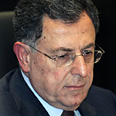
Fouad Siniora
Photo: AP
Lebanon's president appointed Prime Minister Fouad Siniora on Wednesday to head a national unity government agreed under a deal ending 18 months of political conflict.
Muslim Convert
Vered Luvitch
Jailed in 2002 for six-year prison term, Muslim convert Nasim Nasr has already completed his sentence but is still being held in administrative detention. His attorney insists timing of Nasr's deportation to Lebanon 'not by chance'
President Michel Suleiman asked Siniora, who has enjoyed strong US backing, to form the cabinet that is set to govern until a parliamentary election in 2009.
The Hizbullah-led opposition is guaranteed effective veto power in the new government under the Qatari-mediated deal that ended a crisis which pushed Lebanon to the brink of civil war.
"I call on everyone to take part in treating the wounds and moving beyond the divisions ... and violence we have known," Siniora said after meeting Suleiman.
The constitution requires the president, who was elected by parliament on Sunday, to appoint the candidate backed by the largest number of lawmakers. MPs informed Suleiman of their preferences earlier on Wednesday.
The US-backed parliamentary majority bloc had already declared its support for Siniora, determining the outcome in advance. The post must be filled by a Sunni according to Lebanon's sectarian power-sharing system.
Opposition guaranteed 11 seats
Siniora, who won the backing of 68 of parliament's 127 members, had led the government through the political conflict that culminated in fighting that killed 81 people.
Prime minister since July 2005, Siniora, 65, was frequently the target of opposition enmity. A former finance minister, he was depicted as a US puppet by his opponents.
"We did not nominate Prime Minister Siniora as a challenge, but for reconciliation and to turn the page," majority leader Saad al-Hariri, Lebanon's strongest Sunni politician, told journalists after informing Suleiman of his choice.
Hizbullah, a Shiite group backed by Syria and Iran, did not put forward its own candidate for prime minister.
"The candidate to head the national unity government should have characteristics that reflect this title," said Mohammed Raad, the head of Hizbullah's parliamentary bloc.
The opposition declared Siniora's last cabinet illegitimate in November 2006 after all its Shiite ministers quit in protest at the governing coalition's refusal to meet its demand for veto power.
Under the Doha agreement which ended the crisis, the opposition is guaranteed 11 seats in a new cabinet of 30 -- the third plus one it needs to block decisions.
The ruling coalition yielded to the opposition's demand after Hizbullah and its allies routed their rivals in a military campaign this month.
The conflict was triggered by cabinet decisions to investigate Hizbullah's private telecommunications network and to fire a security official who was regarded as being close to the group.















